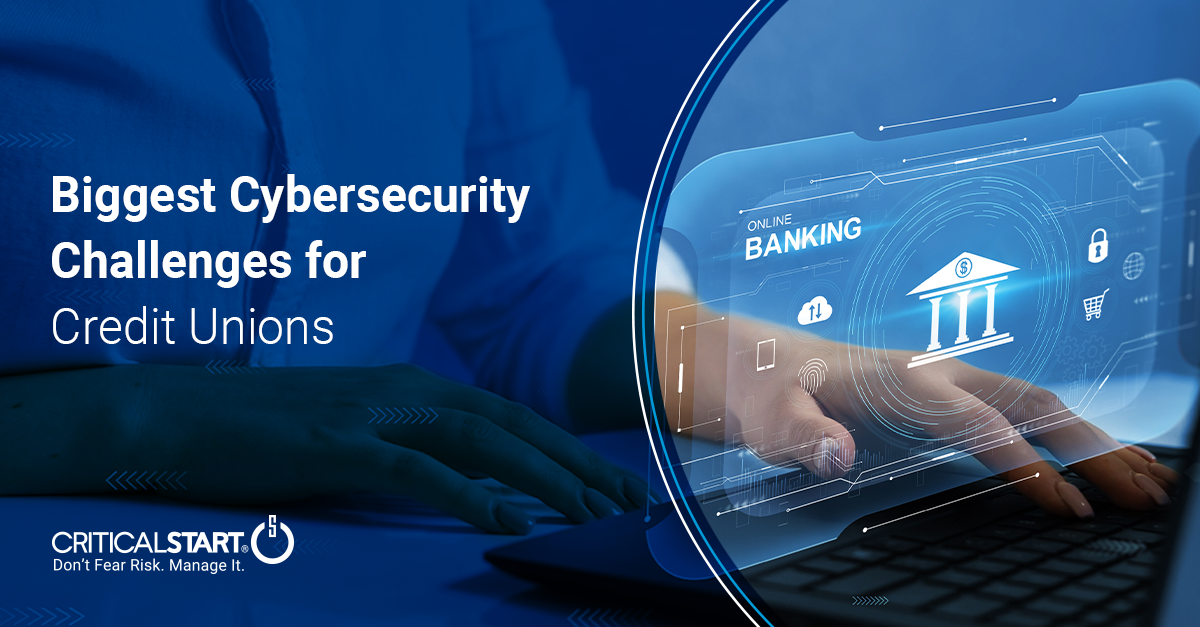The Biggest Cybersecurity Challenges for Credit Unions

Credit unions play a vital role in the financial sector, offering essential financial services to their members. However, the digital landscape also puts credit unions at risk of cyberattacks and other vulnerabilities.
There is a rise in cyberattacks against credit unions, according to the National Credit Union Administration (NCUA).
Credit unions must proactively fortify their information security measures to ensure their resilience in response to the escalating threats of data breaches, phishing, ransomware attacks, malware, and cyber incidents.
Keep reading to see some examples of credit union cybersecurity threats and how to prevent them.
Biggest Credit Union Cybersecurity Threats
Credit unions face various cybersecurity threats and need protection to safeguard sensitive information. Understanding these risks is essential for devising effective countermeasures. Some of the most significant threats include:
Using Old Tech and Software
Outdated technology and software are vulnerable entry points for cyber attackers. Legacy systems may lack critical security patches, making credit unions susceptible to exploitation by hackers and threat actors.
Credit Card Fraud
Fraudulent credit card transactions are a constant concern. Stolen credit card data can lead to financial losses and tarnished member trust.
Mule Accounts
Cybercriminals use mule accounts to launder money and funnel illicit funds.
Phishing
Manipulation of human psychology can trick employees into divulging confidential information or transferring funds to unauthorized accounts.
Ransomware
Ransomware attacks can freeze operations by encrypting crucial data until a ransom is paid, causing financial losses and damaging the credit union’s reputation.
Earlier this year, a ransomware attack affected 15 financial institutions reported that customer’s information like names, social security numbers, and other confidential information were involved in a data breach caused by a software vulnerability.
Malware
Malicious software can infiltrate systems, steal data, and compromise operations, causing significant disruptions.
A credit union in Connecticut experienced a cyberattack, forcing officials to temporarily shut down online banking after detecting suspicious activity. Luckily, no member data was compromised, but fake websites emerged, and members were advised to reset credentials before the site’s restoration.
Lack of Cybersecurity Experts
The shortage of cybersecurity experts poses a challenge, particularly in small credit unions. Credit unions struggle to find and retain skilled professionals to manage their digital defenses and protect against hackers, dark web threats, and other vulnerabilities.
Best Practices for Credit Union Cybersecurity
A robust cybersecurity program is essential to protect credit unions and their members from risks. Some best practices are:
Have a Plan
Conduct risk assessments and develop a comprehensive cybersecurity plan that outlines strategies to prevent, detect, and respond to threats. Secure credit unions to align with the recommendations of organizations like the Federal Financial Institutions Examination Council (FFIEC).
Keep Your Security Software Updated
Regularly update security software and applications to help protect against the latest threats. This will help to safeguard against hackers, data breaches, and cyber incidents.
Keep Files and Data Encrypted
Encryption makes it harder for unauthorized users to access sensitive data, adding a layer of security and enhancing regulatory compliance.
Get a Cybersecurity Assessment and Audit
To discover vulnerabilities and address weaknesses in your cybersecurity infrastructure before they become problematic, it’s vital to conduct frequent audits and assessments.
Consequences of a Breach
The fallout from a breach can be severe in the financial industry. The consequences include:
- Loss of data and unauthorized data transfer: Sensitive member data can be stolen, leading to potential misuse or unauthorized transfers.
- Illicit expenditures and financial fraud: Stolen data can be exploited for financial gain, resulting in fraudulent transactions and financial losses.
- Issuing new debit cards and rectifying member accounts: Following a breach, credit unions must issue new debit cards and rectify compromised member accounts, causing operational disruptions. A replacement can cost $3-5 per card.
- Financial setbacks due to operational interruptions: Operational disruptions due to a breach can result in financial losses and hamper daily operations.
- Harm to reputation leading to member attrition: Cybersecurity credit union risks, like a breach, can erode member trust and loyalty, leading to attrition as members seek more secure alternatives.
Safeguarding the Future with Cybersecurity for Credit Unions
Credit unions must remain vigilant and proactive in mitigating cybersecurity risks. By understanding the potential risks, adopting best practices recommended by organizations like the NCUA, FFIEC, and the National Institute of Standards and Technology (NIST), conducting thorough risk assessments, and preparing for potential breaches, credit unions can bolster their defenses and safeguard the financial well-being of their members.
Prioritizing cybersecurity is not only a responsibility but a necessity to ensure the integrity of credit unions. Credit union cybersecurity compliance ensures healthy partnerships with service providers, addresses critical infrastructure concerns, and contributes to the security of the broader financial system while countering hackers, cyber risks, and information security threats.
Federally Insured Credit Unions Fortify the Financial System
Federally insured credit unions are pivotal in the financial services sector, providing essential financial offerings to members. However, this makes them attractive targets for cyber attacks that can compromise sensitive member data and disrupt financial operations. As part of the broader financial system, these institutions play a critical role in upholding the security and resilience of the entire network.
Navigating Risk Assessments for Cybersecurity Excellence
An integral part of effective cybersecurity in a credit union is conducting comprehensive risk assessments. These assessments involve identifying potential vulnerabilities, evaluating potential threats, and understanding the impact of a cyber incident on credit union operations. Risk assessments empower credit unions to allocate resources strategically, prioritize cybersecurity measures, and build a resilient information security framework that withstands evolving cyber threats.
Safeguarding the Backbone with Critical Infrastructure Protection
Critical infrastructure protection is pivotal for credit unions. Protecting the core technological infrastructure against cyber attacks and disruptions is essential to ensure uninterrupted service and maintain the trust of credit union members. Robust information security measures help prevent potential breaches that could end in losses and instability.
Protect Your Credit Union with Critical Start
As cybersecurity threats evolve in complexity, Critical Start transforms alongside them. We are committed to protecting credit unions from cyber threats, ensuring their security, prosperity, and members’ trust remain unshaken in the face of adversity.
RESOURCE CATEGORIES
- Buyer's Guides(1)
- Consumer Education(39)
- Consumer Stories(2)
- Cybersecurity Consulting(4)
- Data Breaches(15)
- Data Privacy(43)
- Incident Response(2)
- Interview(51)
- MDR Services(59)
- MobileSOC(6)
- News(5)
- Press Release(101)
- Research Report(9)
- Security Assessments(2)
- Thought Leadership(19)
- Threat Hunting(3)
- Video(1)
- Vulnerability Disclosure(1)
